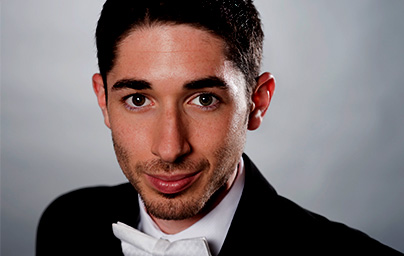Master Chorale takes flight in Haydn’s “Lord Nelson” mass

Brett Karlin conducted the Master Chorale of South Florida in Haydn’s “Lord Nelson” mass Friday night in Fort Lauderdale.
The soaring interior of Fort Lauderdale’s Coral Ridge Presbyterian Church resounded with music of Haydn at his grandest and most expressive Friday night, as the Master Chorale of South Florida performed the composer’s “Lord Nelson” mass.
Haydn’s own title for his 1798 masterpiece was “A Mass for Troubled Times,” a name taken to reflect Austria’s desperation in its war with Napoleon’s France. The popular name for the work was attached later, after the British Admiral Horatio Nelson’s victories against the French fleet.
In this performance, under the energetic leadership of artistic director Brett Karlin, the chorale and the Lynn Philharmonia Orchestra brought out all the work’s sturm und drang excitement, with admirable clarity, balance and tonal refinement. Haydn is among the most underrepresented of the great composers in South Florida. A performance like this, which captured so much of the religious mystery, drama, energy and joy of the work, makes that omission all the more stark.
Massed in front of the church organ’s towering silver pipes, which were bathed in blue and yellow light, the singers and musicians, opened with an emphatic statement of the Kyrie. The orchestra, which played with tight precision throughout, gave a fiery account of the craggy opening notes, with choral voices entering with crisp accounts of the first lines. The music quickly took flight, as notes cascaded over each other in Haydn’s ascending melodic lines.
The four soloists–soprano Meredith Ruduski, mezzo-soprano Misty Bermudez, tenor Steven Soph and bass baritone Douglas Williams–contributed refined, well-projected voices that stood out from the chorus. Of the four, Ruduski had by far the biggest part. In a light, agile voice that suited this music, she easily handled the fast-moving passages, singing with an effortless virtuosity in rapidly ascending notes and sustained lyricism in the soaring high passages that brought out the profound joy of Haydn’s Christian faith.
The bass-baritone Douglas Williams gave an inspired performance of his long solo in the Qui tollis. He sang long, smooth, legato phrases, with a touch of graininess at the bottom that enhanced the power of his performance.
There is classic polyphonic grandeur to the Quoniam section. The entrances of the sopranos, tenors and the rest were distinct and brought off with great balance and resonance, with a gradual buildup in intensity and force. In Et resurrexit, which describes Christ’s resurrection and ascent to heaven, Karlin, the singers and musicians achieved a joyful momentum that was surprisingly fleet for such massed forces. Ruduski easily handled her rapid-fire part, and the verse ended with a sudden crescendo that brought it to an energetic close.
The concert opened with the first movement of Mozart’s Symphony No. 25, given a brisk, intense performance. Aside from some wayward horn playing, the orchestra played with admirable accuracy, clean intonation and ensemble precision.
The Master Chorale of South Florida will repeat the program 8 p.m. Saturday at First Presbyterian Church of Miami and 4 p.m. Sunday at Wold Performing Arts Center at Lynn University in Boca Raton. masterchoraleofsouthflorida.com; 954-641-2653.
Posted in Performances
Leave a Comment
Sat Apr 30, 2016
at 1:25 pm
No Comments




